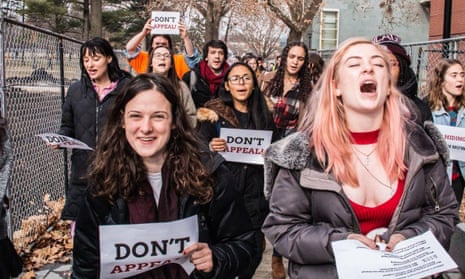A liberal arts college in Iowa is taking a hardline anti-union approach that could put student unions at private American colleges and universities in jeopardy across the whole country.
Grinnell College filed an appeal last week to the National Labor Relations Board (NLRB) after the regional office in Minneapolis denied its request to stop a student union vote on 27 November.
Students at the college had overwhelmingly voted in favor of unionizing all student workers on campus.
The appeal gives the Trump-appointed NLRB – which enforces union labor law – an opportunity to revisit its August 2016 Columbia University decision that ruled student workers at private institutions should be considered employees and have the right to unionize.
The students behind the independent Union of Grinnell Student Dining Workers say they are aware of the potential national implications of the college’s appeal to the NLRB but remain adamant on fighting for their union’s expansion.
“This is just blatant scare tactics that they are trying to use,” Quinn Ercolani, a junior at Grinnell College and president of the student union said. “We’re not persuaded … Everyone knows what’s at stake here. Everyone is frustrated and disgusted with the Grinnell administration approach and what the implications mean.”
Whether student workers, specifically those who are teaching or research assistants, at private college and universities are considered employees, largely depends on the NLRB’s political makeup. The NLRB first determined student workers at private institutions are employees in 2000, when it ruled that a group of teaching assistants at New York University had the right to unionize. It later overturned that decision in a 2004 case involving Brown University graduate students. The 2016 decision reversed the board’s 2004 Brown decision.
Donald Trump’s election has put student unions at risk again. The president has since appointed three out of four members of the NLRB while one seat on the board remains vacant.
Grinnell has hired Proskauer Rose LLP, a union-busting law firm that has worked with schools such as Columbia and Yale. The college argues widespread student unionization undermines the school’s mission and culture, which is based on an educational relationship with the college, rather than an economical one.
“The essential elements of the relationship between Grinnell and its undergraduate students are decidedly educational – not economic,” Grinnell wrote in its appeal.
Labor experts say the board is likely to take up Grinnell’s appeal because it poses the student-employee question the NLRB has been looking to revisit.
“The board is very anxious to reverse Columbia University,” said William Gould, a professor at Stanford Law School and former NLRB chair under Bill Clinton. “They will do so at the first opportunity.”
Since Trump’s election, student organizers, most of whom are graduate students, have made cautious attempts to form unions at their institutions without giving the NLRB a chance to overturn its 2016 decision. Graduate student unions are typically affiliated with a national union, such as the American Federation of Teachers or United Auto Workers.
Some graduate student unions have been successful: Brandeis University graduate workers recently reached a tentative agreement on a bargaining contract with the university, while the Harvard, Brown and Columbia administrations indicated they are open to bargaining with their student unions.
Other graduate student unions have been opposed. After their schools threatened to file appeals to the NLRB following union elections, graduate student unions at Yale, Boston College and the University of Chicago all pulled themselves from the NLRB process in fear their cases could be used to overturn the 2016 ruling.
Grinnell has previously shown an openness to student unionization when it negotiated a contract with an independent student union made up of undergraduate dining service employees in 2016. The contract led to a wage increase for the student workers.
While the school says it is still supportive of this dining services union, it argues students employed in other positions tend to be in roles that are more closely tied with their education.
Because Grinnell College has bargained with its student union students before, its case may not be the strongest opportunity for the NLRB to review its 2016 decision, said William A Herbert, the executive director of the National Center for the Study of Collective Bargaining in Higher Education and the Professions at Hunter College. Grinnell College will have to give sufficient evidence that the expanded union includes student workers whose roles are distinguishable from the dining service employees in the existing union.
Ercolani said the student union’s strategy is to escalate pressure on the college to withdraw its appeal and get to the bargaining table. The group has been organizing protests and marches around campus to continue pushing the college to negotiate.
Grinnell alumni voiced their support for the student union, submitting a letter with more than 100 signatures to the student paper. Ercolani also said the student organizers talked to other union organizers around the country for advice and received their support.
But the college affirms that it won’t back down on its appeal, saying that expanding unionization to student workers in education-related roles would undermine the school’s mission and culture.
“We are determined to do everything necessary to preserve our educational mission,” Debra Lukehart, Grinnell vice-president for communication, wrote in a statement to the Guardian.
